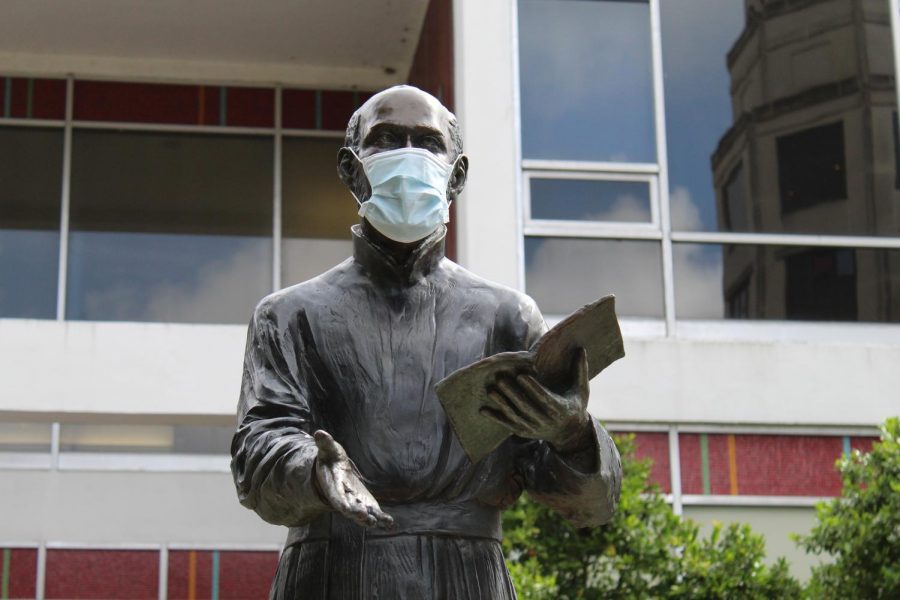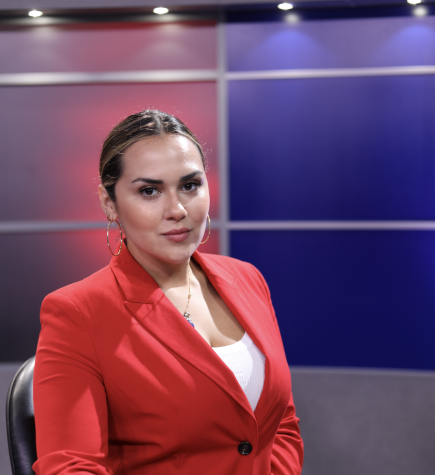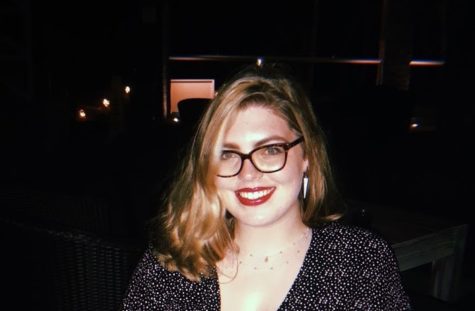Loyola plans to reopen as COVID-19 cases in Louisiana rise
The statue of St. Ignatius of Loyola wears a protective face mask in the Peace Quad on Loyola’s campus June 2020. Loyola is ending its mask mandate on March 9.
July 24, 2020
As Louisiana surpasses 100,000 total cases of COVID-19, Phase 2 of reopening the state has been extended, but Loyola still plans on reopening campus, with students traveling from all over the country, and world, to attend class beginning Aug. 24.
The university has laid out social distancing and mandated masking guidelines for the return to campus, which will include both in-person classes and on-campus housing.
In preparation for the Loyola community’s return to campus, the university plans to provide on-campus, but non-mandatory, testing for those who exhibit symptoms. It has also mandated masking in public, prepared shared spaces for social distancing, set aside rooms for student that need to self-isolate and prohibited visiting between residence halls.
University sets up reopening policies
University plans will follow state and city guidelines as reopening campus approaches as well, according to Loyola Chief of Staff Lesli Harris.
City guidelines include a mask mandate in public as well as limited indoor gatherings to 25 people and limited outdoor gatherings to 50 people, according to the City of New Orleans. Other restrictions include a ban on live entertainment as well as a need for bars that don’t serve food to remain closed.
“All of these plans are in flux because we can’t predict the future, but we’ll have to take our cues again from the state, the city and the Board of Regents,” Harris said.
The university will require everyone to wear masks on campus in public spaces, including classrooms. Students are expected to come to campus with masks at their disposal, but Loyola will also give all community members a Loyola-branded mask. There is a mask requirement exception, however, for faculty who are positioned at least ten feet away from students.
“I can imagine a scenario where students are in the seats in Nunemaker and the faculty member is speaking from the stage, and because there is enough distance between them and students, they would not necessarily need to be wearing a mask,” Harris said.
This distance exception has been approved by Ochsner experts, according to Harris.
Medical Director of Infection Prevention at St. Tammany Health Systems Dr. Michael Hill said Loyola’s safety measures are significant, but still raise concerns.
“In my opinion, still, at a ten foot distance, if I had a choice to wear a mask or not to wear a mask, I would still want folks who were speaking to me to wear a mask,” Hill said.
Hill said it’s important that people wear masks and that the classrooms are designed to keep people further apart. He believes the classroom will be the safest part of on-campus interaction. Outside of the classroom, however Hill said there is reason to be concerned.
On-campus spaces such as the Orleans Room, Starbucks, and the Danna Center are locations where students will have to be more careful, according to Hill.
“I understand the need for socialization,” Hill said. “I can’t blame people, but it just goes to show you the virus doesn’t care. It’s just going to take advantage of the situation.”
Hill encouraged students to remember that COVID-19 is a fluid situation and that what is known today may not be the same next week.
Much like a hurricane evacuation plan, Loyola is asking students to fill out individual COVID positive plans in the event of a positive virus case on campus, according to Director of Residential Life Amy Boyle.
“It just allows the student and their family to be a part of that process,” Boyle said.
Ochsner Health Care will provide COVID-19 testing for students who show symptoms. However, according to Harris, a plan is also in the works for exposed students in addition to those with symptoms who may be able to be tested at centers citywide.
Loyola will also be partnering with an app that will quiz participants on how they are feeling every day, looking for alleged symptoms of COVID-19, according to Harris.
Harris said the app will let you know if you are healthy enough to come to campus.
In a virtual town hall July 23, University President Tania Tetlow said students should also file for financial aid appeals if they have had changes to their finances due to COVID-19.
Cases, and concerns, are rising
Loyola’s policies come amid surging COVID-19 cases nationwide, which have forced some colleges such as Spelman College and UC Berkeley to close their campuses for the fall, even after developing elaborate plans to reopen, according to NPR.
Spelman College President Mary Schmidt Campbell called the decision to close their campus “an honest appraisal of the facts.”
The closure of Spelman’s campus as well as some colleges’ decisions to move forward with in-person classes have launched a nationwide conversation, including hesitation by university officials, about whether or not schools should be reopening and welcoming students back onto campus in the fall.
Loyola’s decision to only require testing for students who show symptoms also comes about as a study led by Yale and Harvard reported that outbreak control at a university would likely require testing of all students, regardless of symptoms, at least every two to three days.
Residential Life implements new reopening policies
Harris said the university is also in the process of adding an addendum to the student code of conduct so that students may be made aware of sanctions that can occur if they do not follow the necessary measures.
Many of these measures depend on students’ behavior as it relates to residential life, according to Boyle.
For example, students will not be allowed to enter residence halls other than those they are assigned to, Boyle said.
Residential life will be taking additional measures to ensure students’ safety on campus, such as cleaning common areas twice a day, leaving cleaning supplies and sanitizing stations for students in or by shared spaces, and including things such as foot pulls on doors to eliminate the need to touch them, according to Boyle. Also, for the most part, the RA program will be virtual.
“We know that in person contact is important to the student experience so that won’t be eliminated but it will be decreased and done in a way that respects all of our social distancing policies,” Boyle said.
Boyle said much of Loyola’s virus prevention plan relies on students and their adherence to campus policies.
Loyola’s also working to advance residential life capacity for students living on-campus this fall, according to Boyle.
As Loyola is allowing students the option to remain home and study remotely, Boyle said that single rooms may be opening up for students. While Loyola allows 13% of on-campus housing as single rooms, Boyle said the percentage has since increased to 25%.
Students who exhibit COVID-19 symptoms will be isolated either in their single dorms or in one of the campus’s 49 rooms set aside for social isolation.
While waiting for and upon receiving test results, students living in social isolation on campus will receive daily check-ins from the university, as well as have their meals delivered to them and their laundry completed by a university partner, according to Boyle.
Students ask for mandatory testing
Robert Morrison III, a business analytics sophomore, said he is concerned about Loyola reopening amidst a lack of mandatory testing as well as the population of the residence halls.
Morrison, who lives on campus, believes the best safety measure would be all students living on-campus to have their own rooms.
“I was talking to my mom a couple weeks ago, and she was saying that when I go to my room at night, I’m going to have to wear a mask,” Morrison said. “In my head, I was like ‘That’s crazy, why would I have to wear a mask to go to sleep inside my own dorm?’ She was saying, ‘Well, you don’t know where your roommate’s been all day. You don’t know where your suite-mates have been. You’re sharing the same bathroom,’ so it’s the same issues you have walking around campus.”
Morrison said he knows there’s cost associated with testing, but he believes there should be access to testing available if otherwise not mandatory.
“If we don’t do that, we’re going to end up in a situation where four weeks later, we’re sent home,” Morrison said.
Morrison said he thinks that testing students once as they arrive on campus could also be a good preventative measure.
Molly Sullivan, sociology sophomore, agreed with Morrison and called Loyola’s lack of mandatory testing “extremely irresponsible.”
“This is the type of logic that is going to put the student population at risk for outbreak,” Sullivan said.
Tulane prepares to reopen its doors
Next door, Tulane University is also reopening, with new safety procedures in place.
In an email sent out by Tulane University President Michael Fitts, the university said all Tulane students, faculty and staff will be tested for COVID-19 for free with the help of Tulane’s School of Medicine. Tulane will also undergo an expansion with 13 temporary classrooms set up as well as an addendum to their dining hall on the Berger Family Lawn. Dining Services employees will be tested for COVID-19 before school commences just as the diners they service, according to Fitts.
Due to COVID-19, Tulane and Loyola have canceled shared dining for the time being. Loyola students are also not encouraged to utilize Tulane’s shuttle system. Instead, Loyola will be bringing back their own form of shuttles, Tetlow said in the July 23 virtual town hall. This change comes about as Tulane students were found to have thrown a party in celebration of Fourth of July, and students and community members alike fear of an outbreak amidst campuses reopening.
University officials say, it’s about trust
“Resilience is part of Tulane’s DNA,” Fitts began the email addressed to the Tulane community. “Today, we must call upon our resilient spirit once more,” he said.
Harris made similar comments to Fitts, noting that, through this time of reopening, she is reminded of the Jesuit values of being men and women for others that Loyola follows.
“I think it’s going to take all of us to keep each other safe, and that’s what we have to think about,” Harris said.
Boyle encouraged those with questions to visit the university’s return to campus guide, or reach out to residential life.
Tetlow ended the Thursday, July 23 town hall by telling everyone in attendance that she has faith in Loyola to make it through the pandemic together.
“This is something we’re going to tell our grandkids about,” Tetlow said. “I can’t wait to see you soon.”









